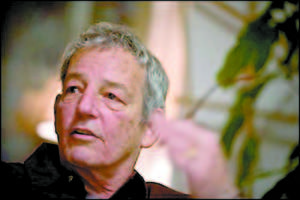The Reading Life: Boiling Point
By Peter Bollen
BN Columnist
In an exclusive interview for The Bridgton News, Pulitzer Prize winning reporter and author, Ross Gelbspan explains the present state of climate change and global warming.
Gelbspan authored two groundbreaking books, The Heat is On and Boiling Point, including many articles and features over the past two decades dealing with the politics and perils of global warming.
PB: What initially got you interested in your work and reporting on climate change and global warming?
RG: In my 30 years as a newspaper editor and investigative reporter, I had no particular interest in the environment. A couple of years after my retirement from The Boston Globe in 1992, I learned that the coal industry was paying a handful of skeptics to say nothing was happening to the atmosphere. At that point, I asked myself, “If there’s a cover-up going on, what are they covering up?†That’s when I immersed myself in the science, economics and all other aspects of global warming. That, in turn, led me into a second 15-year-career — writing and speaking about climate change.
PB: What is your greatest fear in terms of your assessment of climate change?
RG: We have failed to meet nature’s deadline. All kinds of feedbacks are already kicking in — and nature’s timetable is unfortunately very different from our own political pace. In a short time, we will see more crop failures, water shortages, uncontrolled migrations of people whose homelands become uninhabitable and a succession of extreme weather events that will break national budgets. I think the central goal of activists should be to mobilize the countries of the world to begin to forge a plan to manage these climate shocks in a globally cooperative manner. Absent that kind of global initiative, we will see a startling increase in wars over vanishing resources and a wave of domestic repression by governments who feel forced to resort to totalitarian methods to keep order in the face of growing chaos.
PB: Were you ever optimistic about the hope of combating the forthcoming dangers to the environment?
RG: Back in 1998, a colleague and I assembled about 35 experts — energy policy specialists, climate scientists, developing country activists, economists, etc. — to put together a simple plan to rewire the globe with clean energy. The plan, which would create millions of jobs especially in poor countries, received enormous attention at very high levels in Europe and elsewhere. The Environment Minister of the EU (European Union), for example, called it the best plan she had seen. Unfortunately, because of the lack of interest in the topic in the United States, the plan went nowhere. The plan is spelled out at: www.heatisonline/solutions.cfm http://heatisonline/solutions.cfm
PB: Do you feel the “deniers†of global warming/climate change are deceiving the public or handmaidens of the fuel industry — or is it some form of religious belief or also the belief that the earth goes through such cycles as an ice age?
RG: I discovered back in 1995 that coal and oil companies were paying climate skeptics under the table to say global warming is not happening. The reason for that disinformation campaign was clear: a switch to non-carbon energy threatens the very survival of the biggest industry on the planet. Since then, many more people have chosen to deny the findings of more than 2,000 scientists in what is the largest and most thoroughly reviewed scientific collaboration in history. I think this more generalized denial reflects simple cowardice. The threat of unchecked global warming is terrifying. So many people dismiss this as “natural variability†rather than summoning the courage to look reality in the eye and deal with it.
PB: What can the average citizen do in your opinion/judgment?
RG: Many environmental problems can be addressed through lifestyle changes. Global warming cannot. Driving less, turning down your thermostat or eating less meat will make no difference to our overheated atmosphere. If, however, you put more energy into political action — demanding a rapid phase out of coal and oil and an equally rapid switch to windmills, solar panels, wave power, appropriate hydro and eventually a hydrogen economy — that would have the potential to make a much greater difference than lowering your personal energy consumption. I think the central goal of activists today should be to pressure the governments of the world to begin to forge a plan to manage these climate shocks in a globally cooperative manner.
Ross Gelbspan’s website is: www.heatisonline.org
A special thank you to Sally Chappell for her input and interest.
Peter Bollen, a resident of Bridgton, writes an occasional column for The Bridgton News dedicated to books and authors including reviews and news of the book trade. The author welcomes comments and suggestions. He can be reached at pdboll@roadrunner.com


